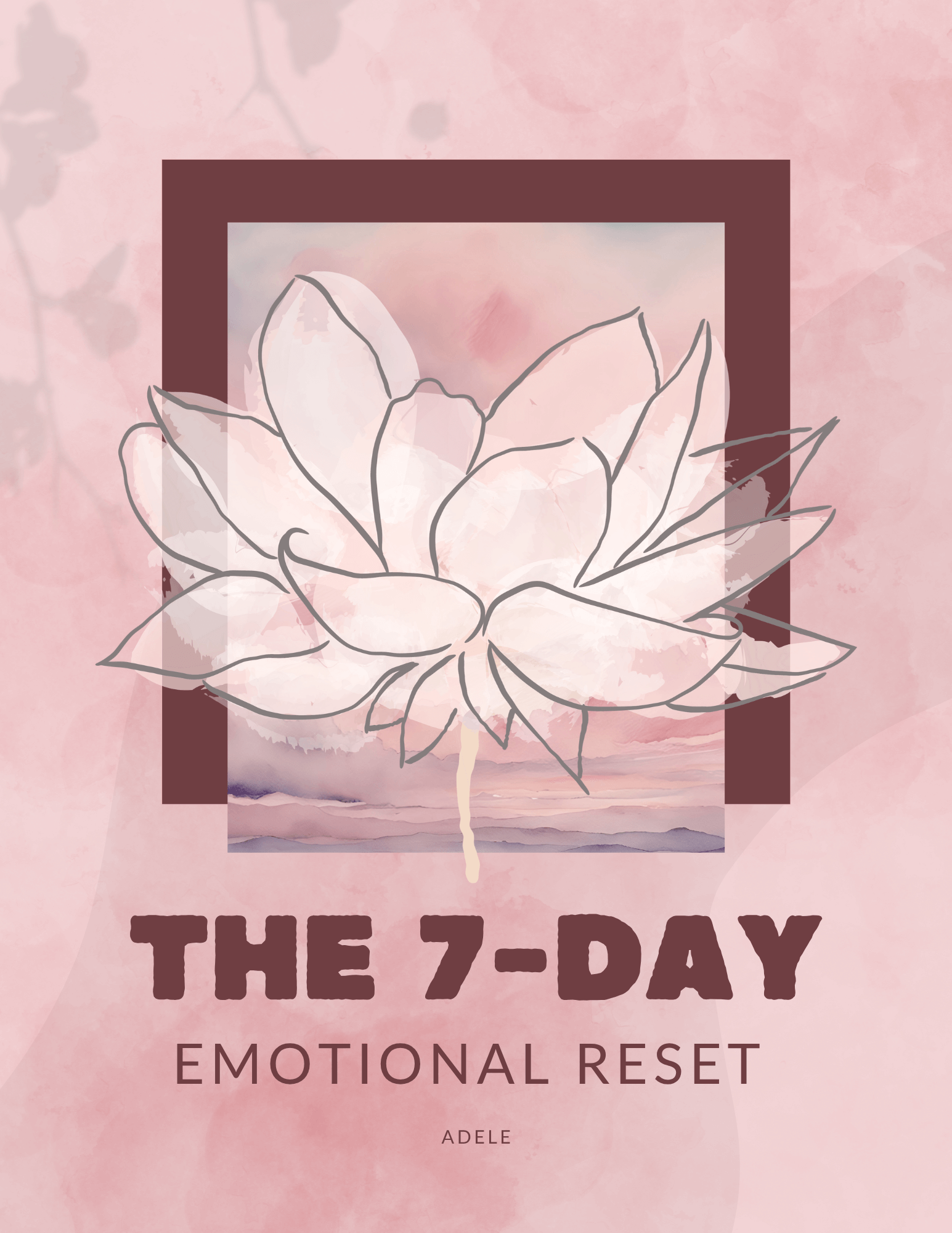You Don’t Have to Fix Everything Today
[Real Ways to Make Small Progress]
You know that feeling when everything in life starts to pile up and you think you should fix it all right now?
It's so normal to feel overloaded when your to-do list never gets shorter. Sometimes, just getting through the day feels like an accomplishment.
You don't have to solve every problem today.
It's okay if things aren't perfect and you haven't found all the answers yet.
Take a breath.
Give yourself credit for showing up and doing what you can.
Here, you'll find ways to pause, reset and take small steps that actually move you forward.
It's not about having it all figured out, it's about making progress, one real, manageable action at a time.
Key Takeaways
- You do not need to solve everything at once. Small actions still count as progress.
- Chasing perfection and quick fixes often leads to stress and burnout.
- Focusing on one area at a time helps you see real, steady results.
- Everyday wins, even the messy ones, build confidence and help you keep moving forward.
- Setting better boundaries and practicing self-kindness makes change more doable and less stressful.
Let Go of the Pressure to Fix It All Now
It can feel like you’re standing in the middle of a busy intersection, with demands zipping by from every direction.
You may catch yourself thinking you should juggle work, family, and personal issues at the same time, and fix them without missing a beat.
If this sounds familiar, you’re not alone. Many people feel that same urgency to clean up every part of their life all at once, but that expectation isn’t just unrealistic—it’s unhealthy.
Let’s look at where this pressure comes from and what it really does to your mind and body.
Where the Pressure Really Comes From
The urge to “fix it all now” isn’t just your idea. It’s built from outside and inside forces all working at once. Here’s a closer look at what feeds that overwhelming feeling:
- Society’s Expectations: There’s a strong message everywhere you look that you should be instantly productive and always on top of everything. Social media only adds fuel to the fire, making it easy to compare your messiest moments with someone else’s highlight reel.
- Family Beliefs: Maybe you grew up hearing things like, “Don’t let things slide,” or, “Fix your problems before they get bigger.” It’s natural to carry those lessons into adulthood, even when life gets too complex for quick solutions.
- Personal Standards: Sometimes, you’re your toughest critic. If you connect your value to how fast you solve problems, it’s just a hop to feeling like you’re not good enough if things are left unfinished.
When you combine these sources, it’s no wonder the weight can feel crushing.
Everyone’s pressure points are different, but almost everyone feels the squeeze at some point.
The High Cost of Chasing Perfection and Fast Change
It’s easy to think that “just trying harder” or fixing everything in a rush will help.
Research shows the opposite is true.
Pushing yourself to solve it all often backfires. Here’s how that plays out:
- Increased Stress: Constantly trying to resolve every issue instantly ramps up your stress hormones. When your mind is always on alert, you feel wired and tired at the same time. It’s hard to rest, focus, or enjoy anything.
- Burnout: This cycle of never-ending urgency can drain your mental and emotional energy. You might start to feel numb, overwhelmed, or detached from things that used to matter.
- Brain Fog: Chronic stress lowers your brain’s ability to make clear decisions and control emotions. That means you’re more likely to snap, freeze, or forget what you were doing.
- Health Problems: High stress over time is linked to headaches, digestive issues, trouble sleeping, and even long-term problems like heart disease.
Key signs you might be caught in this pattern:
- Struggling to make small decisions
- Feeling out of patience most days
- Losing interest in things you used to enjoy
- Getting caught in a loop of worry about unresolved problems
Why Slowing Down Works (and What Happens When You Don’t)
Imagine trying to put together a puzzle while someone shakes the table.
That’s what it feels like to fix everything in a hurry. Giving yourself permission to pause doesn’t mean ignoring problems.
It means giving your mind the space it needs to actually think, adjust, and breathe.
When you stop the “all at once” mindset, you allow:
- More Useful Problem-Solving: Your brain is wired to solve problems better when it isn’t overwhelmed by pressure.
- Greater Patience: Pausing helps you see hope and options instead of just stress.
- Stronger Connections: Letting go of the rush creates space to ask others for help or share what’s really bothering you.
You don’t have to quit caring about results.
The trick is learning that everything doesn’t depend on you fixing it right now.
In fact, giving yourself space can actually help you make stronger, more lasting changes—one step at a time.
Why Small Actions Matter More Than Big Overhauls
Thinking you need a total overhaul to improve your life often sets you up for frustration.
There’s real, science-backed power in focusing on small actions instead of giant, all-at-once changes.
Consistency beats intensity every time. When you pick one thing to focus on and notice your progress in everyday moments, you build habits that actually stick.
Let’s dig into how to do this in your own life.
Pick Just One Area to Focus On
Trying to improve everything at the same time is like trying to spin plates on every finger—eventually, something drops.
If you pick just one part of your life to work on, you’ll see better results and feel a lot less overwhelmed. Narrow your focus so you can find real traction.
Here’s why this single-focus approach works:
- Less Stress: You’re not juggling a dozen changes at once, so your brain can be present and less scattered.
- Clear Wins: You see progress faster, which motivates you to keep going.
- Consistency: It’s easier to turn a small step into a real habit if you aren’t pulled in multiple directions.
Let’s say you want to eat better, sleep more, and move your body regularly. What if you just start with walking ten minutes each morning?
Once that sticks, you’ll feel more confident in adding another small goal down the road.
Consider these tips to make it easier:
- Start with the part of life that feels most possible right now—not the hardest.
- Write down one clear action you’ll take every day (even five minutes can count).
- Notice when your mind drifts to “fixing everything” mode, and gently bring it back to your one focus.
This approach builds momentum. When you see yourself following through—even if the action is tiny—you prove to yourself that positive change is possible.
Find Wins in Everyday Moments
Big results don’t usually arrive from huge efforts, but from stacking up lots of smaller wins you often overlook.
The key is to notice and celebrate these simple moments. Small actions, like making your bed or choosing water over soda, chip away at larger challenges, making the big stuff feel a little less impossible.
Research shows that small, healthy routines improve mental well-being and bring structure to your day.
Noticing those moments gives your brain a positive feedback loop, increasing motivation and confidence.
It’s like adding pebbles to a jar—eventually, the jar looks full, even if no single pebble seems impressive on its own.
Here are some everyday wins worth noticing:
- Getting out of bed on a tough morning
- Making your lunch instead of grabbing fast food
- Sending a supportive text to a friend
- Taking a five-minute walk outside
- Saying “no” to an extra responsibility when you need rest
The impact of these little wins grows over time. You start to trust yourself more. That sense of progress creates resilience, making it easier to handle harder days.
Try this: each night, jot down one small thing you did well. You might be surprised by how quickly these tiny wins add up and shift the way you see your day.
Building habits around noticing and celebrating these moments means your progress feels real—not just an abstract goal out in the distance.
That’s how slow, steady steps lead to lasting results.
Tools to Pause, Reflect, and Set Realistic Goals
Feeling stuck as you try to keep up with chores, work, or endless mental lists? Sometimes, the best thing you can do is stop and check in with yourself.
You don't have to bulldoze through problems each day.
A few mindful habits and simple tools can help you pause, notice what's really going on, and set goals that actually fit your life.
Think of these steps as short breaks that keep you from running out of steam.
Here's how you can protect your energy and adjust your path with intention.
Setting Healthier Boundaries
Saying yes to everything, whether it's tasks, favors, or even your own unrealistic plans, will leave you worn out.
Think of your time and energy as a limited fuel tank. If you let everyone pull from it—without stopping to check your level—you’ll run out fast.
Learning to say no isn’t rude; it’s responsible. It puts your needs at the center, not at the bottom of the pile. To build better boundaries:
- Notice the asks: Pause when someone (or even your inner critic) makes a demand. Ask yourself, “Do I have the bandwidth for this today?”
- Respond gently: Instead of a flat “no,” try phrases like:
- “I wish I could help, but I can’t take this on right now.”
- “Let me think about it and get back to you.”
- “I need some time for myself.”
- Protect your energy: Limit your exposure to draining situations or people. Take a few minutes to step outside, turn off notifications, or just close your eyes and breathe.
- Make space for what matters: Boundaries clear room for what truly supports your growth. When you hold back from unhelpful demands, you create space for real, meaningful changes.
Ask yourself each morning: What do I actually want to say yes to today? Setting clear limits will help you build progress instead of just survival.
Practicing Self-Kindness and Patience
Imagine the compassion you’d show a friend struggling with a setback or bad day. Now flip that kindness back on yourself.
Real change takes time—sometimes longer than you want. Be gentle with your self-talk and recognize that every step counts, even the small, awkward ones.
Here’s how you can practice patience and self-kindness right now:
- Talk to yourself like a friend: When you catch harsh internal chatter, ask, “Would I say this to someone I love?”
- Write a quick journal note: Take five minutes at the end of the day to jot down:
- What worked, even if it was tiny
- How you felt
- One thing you’re proud of
- Check in with your needs: Pause a few times each day. Name the emotion you feel—overwhelmed, hopeful, tired, excited. Ask, “What do I need most right now?”
- Normalize slow progress: Remember, plants don’t grow overnight. Celebrate effort instead of just the finish line.
- Practice gentle reminders: Post notes or keep reminders handy, such as:
- “It’s okay to take a break.”
- “I can start again tomorrow.”
- “Resting is part of progress.”
The kinder you are to yourself, the more likely you’ll keep going—even on tough days. The point isn’t flawless progress; it's steady, honest growth. Give yourself room to breathe and believe that each pause brings you closer to the life you want, one realistic goal at a time.
Celebrate Messy Progress
Progress is rarely neat.
You might picture “having it together” as a perfectly organized desk or a series of flawless days, but reality looks more like sticky notes, unfinished tasks, and trying again after you fall short. Still, the act of showing up—even in the mess—matters far more than a perfect result.
True growth doesn’t happen in straight lines. When you recognize and appreciate the imperfect steps you take, you build habits that last and resilience that holds up through hard times.
Messy progress means you kept moving, even when motivation was low or things were out of your control. Instead of judging every stumble, try noticing all the ways you keep showing up for yourself, especially when it’s hardest.
You’ll find that these moments, not just the finish line, shape your self-worth and fuel your drive to keep going.
Growth Doesn’t Have to Look Perfect
Improvement looks different for everyone.
Sometimes it’s starting the laundry, making a phone call you’ve put off, or just deciding to eat something nourishing when you don’t feel like it.
Other days, showing up is simply brushing your teeth and making it out of bed.
Studies show that the act of showing up on hard days delivers real benefits. When you commit to small actions, you:
- Build internal accountability. Doing what you said you would, even when it’s uncomfortable, helps you trust yourself more.
- Boost resilience and self-confidence. Each follow-through tells you that you’re the kind of person who tries, no matter the mess.
- Encourage long-term, steady change. Consistency creates a stronger foundation than quick, dramatic bursts of effort.
Remember, it’s okay (and expected) for your journey to look chaotic. What matters is that you kept going, not that every step followed a perfect plan.
Stories of Messy Progress That Matter
Picture a college student juggling courses, part-time work, and family obligations.
Some semesters, she aces her classes. Other times, she struggles just to pass. It’s not the straight-A semesters that build her self-belief. It’s turning in a paper after crying through writer’s block, or emailing a professor when overwhelmed.
Those acts of showing up, especially when things felt hard, gave her proof that she could keep moving—even when the outcome wasn’t ideal.
You’ve probably had your own “messy win” moments:
- Dragging yourself to a workout and going through the motions, even if it’s a short session
- Admitting to a friend that you’re struggling, instead of pretending you’re fine
- Returning to a project after feeling like a failure the day before
These moments are worth honoring. They count as real progress, because you chose not to give up.
The Science of Honoring Effort
Psychology research backs up the value of focusing on effort, not just results. When you celebrate your actions—especially the small, awkward, or sloppy ones—you strengthen neural connections that support motivation and learning.
A key takeaway from studies on self-compassion and growth:
People who notice their own effort are more likely to keep working toward their goals, even after setbacks.
What does this look like in practice? You give yourself credit for:
- Writing a single sentence when stuck on a big project
- Making a doctor’s appointment despite anxiety
- Reaching out for help when you feel alone
- Taking five minutes for self-care during a busy day
These “micro-wins” add up. They help you see setbacks as part of the process, not as proof you should give up.
Here’s a quick table showing what progress looks like in real life:
Perfect Progress Fantasy | Real-Life Messy Progress |
Never miss a workout | Show up tired but do it anyway |
Home always spotless | Declutter one drawer at a time |
Flawless mood daily | Accept rough mornings, restart later |
Meet all deadlines early | Ask for deadline help when needed |
How to Celebrate Small, Messy Wins
You don’t need a trophy case for small steps, but you do deserve recognition for every bit of progress. Here’s how to make that happen:
- Pause and notice: At the end of the day, call out a moment you kept going.
- Share it: Tell a friend, journal it, or post an honest note somewhere you’ll see it.
- Reward yourself: Treat yourself gently after tough days. Sometimes it’s a nap, your favorite snack, or an episode of a show you love.
- Rethink what counts: If you showed up for yourself in any way, that’s progress.
You’re not just moving forward when everything is smooth.
Every time you show up, despite the mess, you prove that you matter—your effort, just as much as the outcome. That’s what real, lasting growth is built on.
What’s Next
You don’t need to do it all today.
Progress counts, no matter the size of the step.
Let yourself be proud that you’re choosing to move forward, not stay stuck.
The small actions you take will make a real difference over time, and each one gives you more proof that change is within reach.
Pick one tiny thing you can do right now, even if it feels simple. Then call it a win. Thank you for reading—your effort matters.
If you want, share your tiny steps below or tell someone about your progress.
Remember, just starting is more than enough for today.
FAQ
A: How do I know what area to focus on first?
Q: Pick the part of your life that feels doable, not the most difficult. Choose something small that seems possible right now.
Q: Pick the part of your life that feels doable, not the most difficult. Choose something small that seems possible right now.
A: How can I stay motivated when progress is slow?
A: Notice small wins each day and write them down. This helps you see how much you are actually doing, even if it feels slow.
A: Notice small wins each day and write them down. This helps you see how much you are actually doing, even if it feels slow.
Q: What if I still feel overwhelmed by my problems?
A: Set better boundaries, take breaks, and focus on one clear action at a time. Talk kindly to yourself and ask for help when needed.
A: Set better boundaries, take breaks, and focus on one clear action at a time. Talk kindly to yourself and ask for help when needed.
Q: Do small actions really matter over time?
A: Yes, stacking small steps each day builds lasting habits and real change. Research shows steady progress works better than fast, dramatic changes.
A: Yes, stacking small steps each day builds lasting habits and real change. Research shows steady progress works better than fast, dramatic changes.
Q: How do I set boundaries without feeling guilty?
A: Remind yourself that saying no protects your time and energy. It is not rude to choose what matters most to you. Boundaries help you make space for real progress.
A: Remind yourself that saying no protects your time and energy. It is not rude to choose what matters most to you. Boundaries help you make space for real progress.














0 Comments